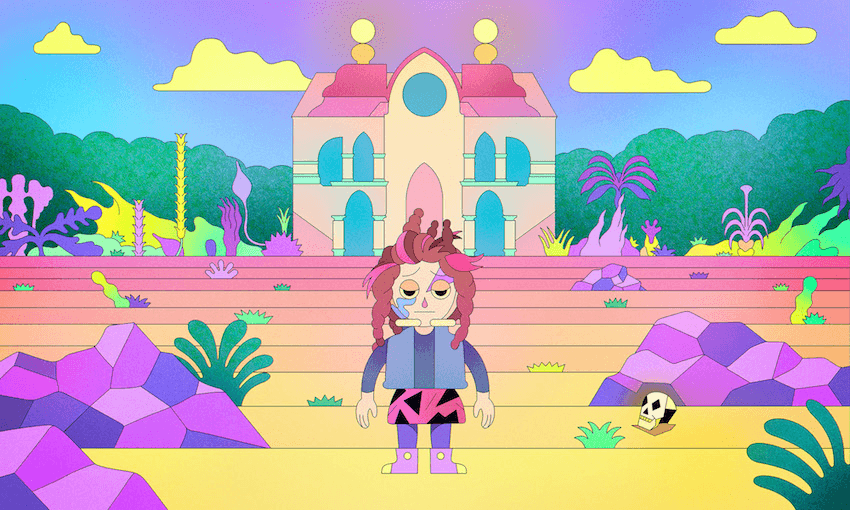Actor Amelia Reynolds starred in the hugely popular TV show The Tribe as a child. Her experience wasn’t all fun and games.
The Sunday Essay is made possible thanks to the support of Creative New Zealand
Original illustrations by Pablo Espinosa
They wanted me lying on a dirt path, writhing in agony after eating poisonous berries. I didn’t want to be told off for getting my costume muddy. It was my first day on set and I didn’t know the rules, or how I was allowed to behave. Sensing my hesitation, a crew member put down a fragment of a yoga mat to lie on – small enough so that my body would hide it from shot. The director called “action” and I stayed tense, in unconvincing agony, trying to prevent too much of my body touching the ground.
When I was 10, I was cast as Tally, a bratty twin, in season three of the local post-apocalyptic tween television show The Tribe. It was the year 2000 and I was form one at Nelson Intermediate School. A week after I was cast, I flew to Wellington as an unaccompanied minor and began the five-month shoot. I was off on a big adventure to become a famous person. On my last day of school, my class gave me a card wishing me luck and they all signed it. One wrote: “Wow! You are so cool”.
In the world of The Tribe, a deadly virus had wiped out everyone over 18, leaving those who were left to form tribes in order to survive. Children learned to be adults really fast. The Tribe ran for five seasons between 1998 and 2002 and, despite being shot in Upper Hutt, it found a huge audience in the UK and Europe, with a particularly strong fan base in the Netherlands and Germany.
I was one of the Mallrats, a tribe that had settled in a suburban mall. It was set in an undisclosed location, which looked a lot like Wellington, and where everyone had pseudo-American accents. The production design was steampunk-inspired: characters had bright hair, twisted into knots, and wore face paint. Zoot, the villain of the series, wore round brass motorcycle glasses and a leather train-conductor hat. The purpose-built set, a two storey mall, was apparently the biggest in the southern hemisphere at the time.
Next to the set was the green room where the young cast hung out between scenes. Brown and green velvet couches, with tears in the arm, sat below American Beauty and Eddie Murphy’s Holy Man posters, purposely pinned up on funky angles. Most of the actors were in high school, and so it was fittingly decorated like a teenager’s rumpus room. There was even a TV in the right-hand corner which was constantly on but no one seemed to watch, and a few dog-eared board games stacked at the back of the room.
Mum stayed in Nelson while I was shooting. She had just graduated from polytechnic and was in the process of setting up a fashion label. In the meantime, her sole income came from the clothes she made and sold at Nelson’s Saturday market. She couldn’t afford to give that up. It had always been my choice to be an actor – no one in my family was – and Mum did everything she could to make sure I could. When I got auditions she would get my agent to fax the sides down to the dairy. I once missed out on a role because our phone bill hadn’t been paid. I don’t know how she always managed to find the money to pay for my flights to Wellington for auditions, but she did. I had even shot a couple of other roles in TV shows. They were generally only a few days though – this time I’d be away from home for five months.
Production insisted I would be well looked after: I would have a chaperone and live in a cast-house in Thorndon with a host mum and dad, and their two young sons. Mum could call me in the evenings whenever she wanted. I could even travel back to Nelson for a couple of long weekends if I had any extra days off. There was also a fully-equipped classroom on set, complete with two teachers. I would be enrolled in correspondence school, so my education wouldn’t be too disrupted.
The cast-house where I lived was three storeys and was the richest-looking home I had ever seen. Stucco cladding with Mediterranean climbers scaled the exterior and terracotta tiles lined the front courtyard. Inside, all the walls were painted french vanilla and any furniture, of which there wasn’t much, was covered in white linen. Downstairs, the south-facing kitchen and dining room had brick floors that were cold to walk on. My bedroom was upstairs, on the second floor. I was reading Harry Potter and the Goblet of Fire which, sitting on my bedside table, was the only thing that decorated it. Across the hall from me was a massive storage cupboard, stacked from ceiling to floor with the back catalogue of Disney movies. Other than that cupboard, the house was ghostly empty. It felt like a set, where everything was placed as it should be but when you looked closer nothing was particularly functional. There was a TV, couch, basic kitchen utensils, and little else. Despite production’s best efforts, it functioned mostly as the place to learn my lines after a day of shooting. It didn’t welcome me all snuggly with open arms like my house in Nelson did. I couldn’t throw a tantrum when I didn’t want to do the dishes, sleep in Mum’s bed if I felt like it, or stay up past my 8.30pm bedtime on Thursdays to watch Charmed.
One other cast member lived at the house. She was 16. Her bedroom was on the bottom floor and had French doors which went out onto the large rambling green lawn. When she was home she spent most of her time in her room and I never saw her. She loved to make mixtapes and in the green room I would catch glimpses of her gifting personalised ones to other cast members. I wanted one too but was too scared to ask, hoping that my turn would just naturally come. It didn’t, so my host dad took me down to her room to ask on my behalf. A few days later mine arrived. On the back she had written a tracklist in blue biro, it had REM’s ‘Man on the Moon’, ‘Rock DJ’ by Robbie Williams, and two Basement Jaxx songs on it.
A couple of months in, my host mum told me off for not being nice to her eight year-old son. Back home In Nelson, I was an only child – I had no idea how I was meant to treat another kid I was living with. I felt embarrassed and escaped to the roof, which doubled as a sun deck. It was the only place I felt I didn’t have to worry about not understanding the rules and doing something wrong. I would lie on the lone sun lounger that had made its way up there and listen to Zed’s Glorafillia on my Discman, bought with my first paycheque. I also bought myself a push scooter, the first time I had ever felt ahead of a fad, and would zoom up and down the long hallway of the production studios, my warped reflection catching in the sheen of the muted-mustard lino floors.
Among the cast, stories of actors behaving like rebellious teenagers and getting fired were passed around, in fragments, like folklore. There were rumours of the couple who fell in love and ran away on the night train to Auckland and were blacklisted. The actor who cut his hair between seasons and didn’t get invited back. The girl that was written out of the show because she didn’t want to watch the Michael Flatley concert with the rest of the cast. I heard them all as cautionary tales and did everything I could to be liked and to always be on my best behaviour. When I lost my character’s jacket while outside playing one lunchtime, I was petrified of being fired. I worried that all the ambrosia and tiny potato-top pies I was eating were making me put on weight, which I was, and that would be all production needed to let me go. To try and stop that from happening, I would jump on the trampoline for 10 minutes every few days in an attempt to lose weight.
When I wasn’t on set, I put all my energy into doing well at school. A structure that I understood, that I knew how to succeed in. I once completely missed a scene because I had hidden away in a cupboard to record an English project and no one could find me.
Midway through the shoot, a group of five girls from the UK flew over, the winners of a competition to “Spend A Week With The Tribe”. They brought a camera crew and made a TV special – it’s still on Youtube. There is a moment when the school teacher is asked who the most hardworking student is. She says “Amelia” and then it cuts to me, in a green crocheted bucket hat, my long red hair hanging over the assignment I’m working on. I remember the camera crew wanting to film me and that I just wanted to get on with my work.
Almost as soon as the competition winners left I got the flu and missed a week of work. They just had to write me out of scenes. I stayed at home, alone in the mansion’s vast living room with its high ceilings and cold brick floors. I watched daytime TV, like I did at home when I was sick; The Sally Jessy Raphaël Show and Ricki Lake. And then I watched Mulan and The Emperor’s New Groove, blankly, and cried. I could have called Mum on the landline but I was afraid of being told off for wasting production’s money. Calls across the country were expensive and cellphones were a new thing then. Actors would get them as birthday presents from production, a Nokia with interchangeable skins, but my birthday had already been.
I called Mum to do some fact checking for this story. I asked how she remembered I had found the experience. “Oh you loved it,” she said. “You were homesick but you loved it.” She reminded me that she and my stepmum came to set for a visit. She said how “wow” the whole thing was for them. I asked her if I seemed happy and she said that it was hard, a big deal for me, but I loved it. I told her how my memory was different to that. That I felt lonely, trying to navigate as a 10-year-old in a working adult world.
After that call, I looked through my box of old sentimental things – the one with every birthday card and school report in it. I found the cast and crew photo taken at the end of the shoot. I’m smack bang in the centre and I’m coddled by three of the teenage leads – including the one who made me the mixtape. I’m wearing a black top with misappropriated Japanese characters on it and a lime green puffer vest Mum made me. I’m smiling. I look proud. I fit right in. I also found the leaving card from my class. Turns out my memory was lying. No one had written “wow you are so cool”. I guess I just hoped that’s what they thought.

